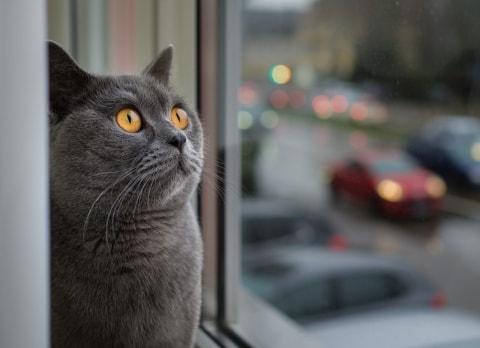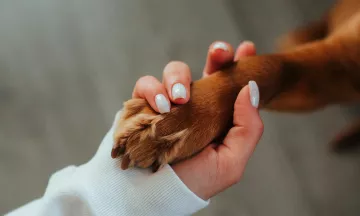"Cats don't have owners, but staff," they say. But is that correct? How attached are cats to their owners, and does a cat miss you when you're gone? In this article, you will discover everything about cats & attachment + useful tips for when you go on holiday.
Cats are both solitary and social
It's true that cats are solitary beings: they know how to take good care of themselves. This also means that (unlike dogs) they don't necessarily depend on people when it comes to attachment and security. Research has shown that cats don't show signs of separation anxiety when their owner is away. Some cat owners know this: you return from a holiday but your cat acts pretty indifferently! Other cats even behave like they are "offended" and pretend not to see you at all.
But many cats are very happy when their owners come home. They meow, come and sit on your lap or on your keyboard ... Some cats follow their owners everywhere around the house.
And this makes sense. Because although cats were originally solitary hunters, they learnt to live in groups under the influence of human society and urbanisation. Many cats are therefore quite social, and need company and interaction with other people and animals.

How do you know if your cat loves you?
Although cats might act cool when you get home, there are plenty of subtle signals that show attachment to their favourite human. Cats show their appreciation by greeting you with a cheerful 'prrrt', by rubbing past you to leave their scent behind, and by pushing their head against you or even nibbling or biting you a bit. Moreover, it is already a clear sign of love if a cat likes to be near you. If a cat stays by your side and doesn't hide from you or run away, it means they are very happy in your company.
Although we know quite a lot about cats by now, they can still behave pretty mysteriously. Some cats might very human-oriented and affectionate, others might just like other cats or just want to go their own way. So pay special attention and adjust to what YOUR individual cat likes and needs. And if you book a personal cat sitter, it is important to tell your cat sitter everything about your cat's character and behaviour. Ask the sitter to maintain your cat's normal routine as much as possible during your holiday.

Cats like routines
Although cats are not totally emotionally dependent on you as a person, they are still attached to your company and care. If you've ever seen your cat strolling around their food bowl at a certain time of day, this is a sign of your cat's 'internal clock'. Cats have a strong sense of routine. This applies not only to their daily routine but also to their location and the composition of the family. A cat that suddenly has to deal with strong changes (moving, a baby on the way, a new pet) can get quite confused and stressed. So try to limit major changes for your cat.
That is why it is important to maintain your cat's daily routine as much as possible when you go on a holiday. Does your cat normally eat twice a day? Do you always scoop out the litter box in the evening? Then ask your cat sitter to follow the same schedule.
Does a cat miss you when you're gone?
Although your cat is ok to be alone for a little while and does sleep a lot during the day, it is a complete misconception that you can leave a cat alone for days. The mental and physical health of a cat depends on their daily dose of stimuli, both from mental and physical challenges. So please remember: a cat needs interaction with either familiar family pets and/or people. Cats that spend their days at home alone can become depressed, overweight and eventually even develop behavioral problems.
If you want to know how your cat behaves when they are alone, you can use a pet spy cam. With a pet camera, you can follow your cat's movements remotely via an app. This is no substitute for human interaction from a cat sitter, though!
Watch a livestream of a kitten cam here. Beware: it's addictive!

Important: use a cat sitter during your holiday
Your cat can feel quite alone during the loss of their normal routine when you are away. So: If you go on a holiday, ask your personal cat sitter to not only give your cat their usual fresh water, food and cat litter, but also sufficient time to play and attention. A Pawshake sitter can come by your house once or twice a day or stay overnight.
A home visit by a sitter from Pawshake takes on average a half an hour to an hour and a half, during which your cat sitter can play with your cat, cuddle or simply sit on the couch together. Not all cats want to play with a cat sitter immediately and might run away and hide. This does not necessarily mean that your cat prefers to be alone, they just might need some time to adjust to their new human friend.
Tips for when you go on holidays:
- Don't move your cat to a new location if you can prevent it (staying in the comfort of home is best)
- Let your pet sitter get to know your cat beforehand
- Keep to your cat's normal routine, but:
- Don't force your cat to do anything they don't want to
- Let your pet sitter play and cuddle with your cat
- Let your cat decide when to interact - give them space
- Provide a scratching post and several safe hiding spots
And the most important advice: don't be offended if your cat doesn't show that they missed you. We often attribute human emotions to a cat (offended, arrogant, sad or affectionate and loving.) But a cat is a cat - who experiences the world in their own special way. So enjoy your cat's natural, special, stubborn and always fascinating cat behaviour for what it is!






